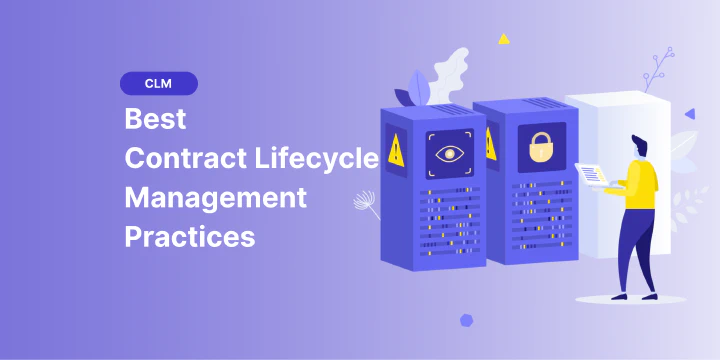Contract management vs. contract lifecycle management (CLM)
Although contract management and contract lifecycle management seem synonymous at first glance, they are not interchangeable. When looking for ways to improve legal workflows in an organization, it is important to know the difference. Otherwise, you run the risk of settling for old-fashioned practices that won’t help you.

To find the best possible approach to contract workflow management, start by looking at the definition of contract management and contract lifecycle management.
Definition Contract Management & Contract Lifecycle Management
Contract management
Contract management refers to the management of contracts from their creation, through their execution, to their termination. Contract management refers to a wide range of processes that encompass all contract-related operations. These processes can be manual, automated or hybrid, where some processes are manual and others are automated.
Contract Lifecycle Management (CLM)
CLM is a forward-looking approach to managing contracts. Contract transactions are divided into defined phases, and the processes in the individual phases of a contract’s life are automated as best as possible to achieve maximum efficiency. This approach mostly requires the use of innovative technologies to customize the processes in each phase of the contract lifecycle.
Contract Management vs. CLM
CLM software uses AI-based technology to manage the entire lifecycle of an organization’s contracts. Implementing contract lifecycle management software is the fastest way to improve contract management and remove obstacles that delay contract creation, negotiation, approval, and renewal. Doing so accelerates contract execution, enables real-time visibility, and achieves simpler contract management while reducing risk and costs.
Contract lifecycle management often includes automated contract creation, streamlined real-time contract editing, transparent approval workflows, and analytics. In contrast, contract management is usually not equipped with functions for automating processes and focuses primarily on the rigid administration of contracts. This is the biggest difference to CLM software.
Below are some of the ways CLM software can help manage contracts:
Automated contract creation: Contract creation takes a lot of time that is unnecessarily wasted. With ready-to-use templates, it doesn’t have to be that way. Because CLM can automate the entire process, only a few questions stand in the way of a complete, error-free draft. Simply answer the questions so the system knows what to include or omit, and the contract is ready for signature.
Centralized storage: Contract management software provides a centralized location for all of a company’s contracts, ensuring that all necessary information is easy to find and retrieve because each user knows exactly where to find the contract information they need. This prevents multiple versions or copies from circulating and causing confusion. A good CLM platform also allows you to easily migrate legacy contracts so that all contracts remain in one place.
Scheduled reminders: In addition to real-time collaboration, CLM allows users to schedule and send automatic alerts and notifications, eliminating the need for manual reminders and unnecessary emails. This reduces the risk of unscheduled contract renewals and missed deadlines.
Streamlined contract processing: Innovative contract lifecycle management offers a collaborative editor that allows multiple people to make changes, add comments, and send sections for review simultaneously and in real time. You can also see what changes or comments stakeholders have made without having to constantly compare contracts to previous versions.
Transparent approval workflows: With transparent, conditional approval workflows, CLM software enables you to get approvals for a contract from the right people at the right time. You’re no longer forced to chase down each person when it’s their turn, nor do you have to double-check whether a particular contract even falls under a person’s purview. Instead, contract lifecycle management software automatically assigns the contract to the required approval flow and then forwards it to the next person it needs to be approved by.
Analytics: Because all of the required data resides in contract lifecycle management, CLM software can quickly capture data about a contract’s performance, obligations and other criteria. This dramatically speeds up the reporting process, so more time can be spent getting non-compliant contractors back into compliance.
Not to mention, modern contract lifecycle management software saves a tremendous amount of time with quick searches, no manual tracking of important data, no manual data entry, and secure and error-free self-service contract creation.
Summary
If you want to stay in control of your contracts, a manual approach to contract management is not the best option. Even when a contract is terminated, it still contains valuable information that can be analyzed.
Contract lifecycle management simplifies workflow and automates contract processes by providing centralized storage and easy access to information. Implementing a CLM system is a strategic step that can help you better manage your contracts and get the best value possible.
Please keep in mind that none of the content on our blog should be considered legal advice. We understand the complexities and nuances of legal matters, and as much as we strive to ensure our information is accurate and useful, it cannot replace the personalized advice of a qualified legal professional.

Table of contents
Want product news and updates? Sign up for our newsletter.
Other posts in Contract-Management

How to Review Business Contracts Like a Pro in 2025
When it comes to business contracts, what you don’t catch can hurt you. That’s why reviewing a business …

10 Best Contract Lifecycle Management Practices in 2025
Remember when closing a deal meant printing five copies, couriering them for “wet” signatures, then hunting …

How to Write a Contract Proposal (+Examples)
Imagine a freelance marketing consultant gearing up to pitch their services to a mid-sized tech company. …
Contracts can be enjoyable. Get started with fynk today.
Companies using fynk's contract management software get work done faster than ever before. Ready to give valuable time back to your team?
Schedule demo

